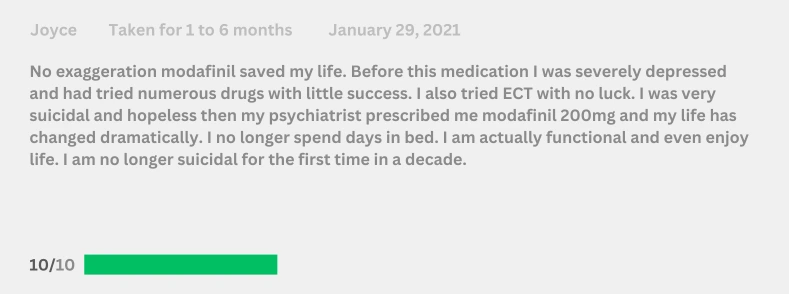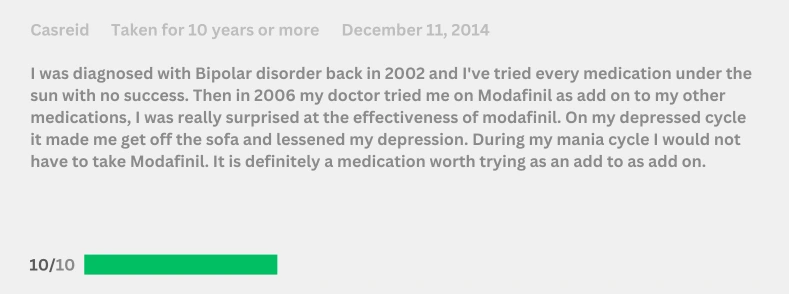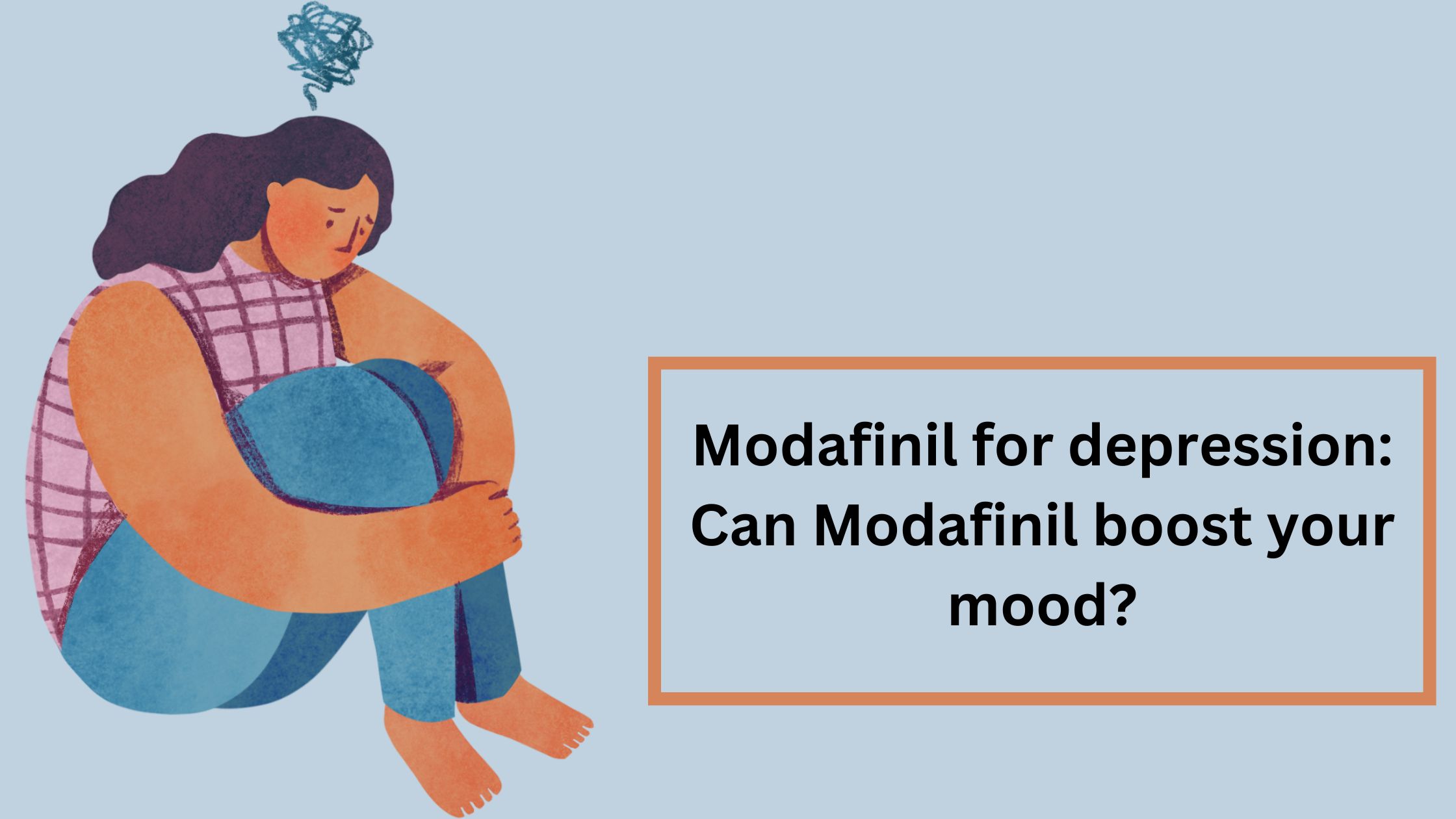Modafinil for depression and mood disorders is not the first line of treatment, and its use for mental health disorders is not approved by the FDA. It is an adjunctive therapy and is prescribed to people who do not respond well to standard antidepressants.
If you or your close ones are suffering from depression, you might often have heard about Modafinil. So, is Modafinil for depression an effective treatment, or does Modafinil help with depression? If yes, how does it work, and does it negatively impact overall health? Rest assured, this blog answers all your queries.
Modafinil And Depression | An Introduction
Let us first understand depression. Depression is a mood disorder. According to WHO statistics, about 280 million people around the globe suffer from depression.
The website Psychiatry has defined it as a common and serious medical illness that can negatively impact how we feel, think, and act [1].
Depression can develop feelings of sadness, and one may lose interest in doing any work. It can lead to various emotional and physical issues. Self-harm is one of the most common effects of depression.
Yet depression is still a taboo, and over 75% of the population does not seek medical help. The notable point is that it is treatable with proper care, therapies, and medications. In this regard, Modafinil is one such option that is accessible and affordable, providing adequate results for improving depression.
Causes of depression
Depression occurs because of chemical imbalances. But as mentioned in health.harvard.edu, depression does not occur because of brain chemicals. There are many other causes of depression, including faulty mood regulations arising from the brain, genetic vulnerability, and stressful life events [2]. Depression treatment with nootropic is off-label but has shown remarkable results in people.
What is Modafinil?
Modafinil is a central nervous system stimulant that promotes wakefulness in people with extreme daytime drowsiness. In the United States, Modafinil is FDA-approved for treating narcolepsy, obstructive sleep apnea, and sleep work shift disorder.
The use of Modafinil for attention deficit hyperactivity disorder (ADHD), acute unipolar and bipolar depressive episodes, cancer and multiple sclerosis-related fatigue, and cocaine dependence are some of the effective and widely accepted off-label uses of the nootropic [3].
Modafinil for weight loss is also gaining popularity, which is caused due to its ability to suppress appetite. However, it is not approved for medical use and should not be taken for weight loss without consulting a doctor.
Modafinil for Depression- How Effective Is It?

A study published in the Journal of Clinical Psychiatry concluded that taking Modafinil in combination with antidepressants can reduce the severity of depression more efficiently than taking antidepressants alone [4].
After adding Modafinil and antidepressants for 6-8 weeks, 348 patients responded partially with major depressive disorder marked improvements in depressive symptoms, residual fatigue, and daytime drowsiness - Fava et al. [5].
Modafinil exerts its effects for treating depression by agonism of central alpha1 adrenergic receptors in the striatum, hypothalamus, and cortex, increasing glutamate levels and decreasing GABA levels, and increasing histaminergic neuron activity, which may be responsible for promoting wakefulness in tuberomammillary nuclei.
Makela et al., in their study, reported that Modafinil increased serotonin and glutamate levels while decreasing GABA levels, and they indicated that Modafinil might have antidepressant efficacy on the serotonin system.
In another study, it was reported that differently from amphetamine derivatives, Modafinil did not cause any reduction in dopamine and noradrenaline level, and it exerted an antidepressant effect, possibly by histamine release and agonism on noradrenaline receptors.
These details indicated that the antidepressant efficacy of Modafinil is complicated, especially by alpha-1 adrenergic receptor (receptors involved in neurotransmission and regulating sympathetic nervous system through activating and binding norepinephrine, neurohormone, epinephrine) agonism, increased serotonin system, and histamine release [5].
You can also check our blog Armodafinil for depression to know the differences between Modafinil Vs. Armodafinil for depression.
Modafinil For Mood Disorders
Along with depression, most psychiatrists recommend getting Modafinil 200 mg tablets to help treat several other mental health conditions. The off-label benefit of Modafinil helps to treat the following:
Modafinil for Bipolar disorder:
Bipolar disorder is a mental illness that causes unusual swings in a person's mood, energy, concentration, and activity levels. This condition includes depressive episodes and mania.
A preliminary study including 85 participants with bipolar disorder shows that Modafinil might control depressive symptoms associated with bipolar disorder.
In the study, a total of 44 percent of patients reported improvement in their symptoms [6].
Modafinil for seasonal affective disorder:
It is a type of depression where people suffer from mood disorders every year at about the same time, especially during winter or climatic conditions that tend to have less sunlight.
In a review, thirteen patients (11 women, mean age 41 years) were enrolled, 12 patients were evaluated for efficacy (100 mg dose of Modafinil was given to five patients, and 200 mg was given to seven patients), while nine of them completed the treatment successfully. Modafinil significantly improved depression associated with seasonal affective disorder [7].
The review concluded that Modafinil may be a well-tolerated and effective treatment in patients with seasonal affective disorder.
Modafinil for Depression Fatigue
Among the various symptoms of depression, fatigue, and sleepiness are the most commonly reported that may not be resolved with antidepressant therapy.
In a study published in the year 2003, the utility of Modafinil for treating depression-related fatigue and sleepiness was examined.
One hundred thirty-six patients were enrolled for treatment, with 87% (118 patients) completing the study. Most of the patients were fatigued (82%), and one-half of the patients were sleepy (51%). Modafinil rapidly improved daytime wakefulness and fatigue.
After completion of the study, it was concluded that Modafinil may be an effective adjunct therapy for short-term management of fatigue and sleepiness in patients with depression [8].
Modafinil Dosage For Depression

The recommended Modafinil dose for depression is 200mg. People suffering from depression can take the recommended dose in the morning with a glass of water.
Do not exceed the daily limit of 400mg. However, it is crucial to consult a health expert before administering the medication [5].
Modafinil Reviews On Depression
On the website drugs.com, Modafinil has an average rating of 8.8 out of 10 for the off-label indication of depression.


Modafinil And Depression - Conclusion
Modafinil offers multiple benefits, which are boosting wakefulness, improving mood, and enhancing our cognitive functions. The efficacy and low Modafinil price contribute to the popularity of the Nootropic.
Backed by research and clinical trials, we can conclude that Modafinil is an effective treatment for depression and other mood disorders. However, it is advisable to consult a health expert or psychologist before taking Modafinil for depression.





 0
0


 March 14, 2022
March 14, 2022  By
By 




